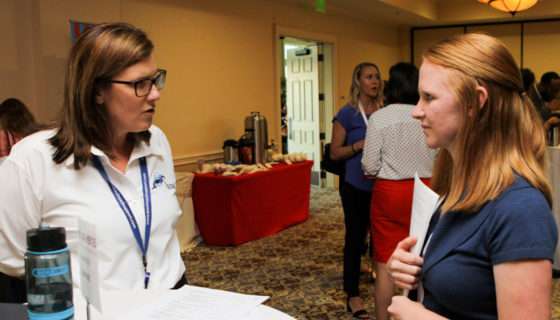Military Spouses Can Look Forward to More Remote Work Opportunities

When Prudential Financial committed to expanding its military spouse hiring initiative in El Paso, the looming question was always – what happens when the military spouse leaves Fort Bliss?
“We already had a relocation program to go from one Prudential office to another, including an international office. We said, ‘How do we leverage this program to build out our military spouse program?’” said Jim Beamesderfer, vice president of veterans initiatives at Prudential Financial.
Leveraging existing relocation policies already in place, military spouses began their careers at the office. And when their service member’s PCS orders arrived, Prudential offered them the option to work as remote employees.

“The whole idea was to allow them to continue to progress in their careers,” Beamesderfer said. “We started doing this across a host of professional roles and we found great success. As we built those internal success stories we got more and more managers that said, ‘Wow I would like to participate in this because I see the benefit.’”
Hiring Our Heroes and Burning Glass, with support from Grow with Google and Google.org conducted a mixed-methods study of barriers to and opportunities for military spouse employment. This project, “Examining Entrepreneurship, Remote Work, and Upskilling as Drivers for Economic Success for Military Spouses,” focused on current challenges to full-time employment and entrepreneurship faced by military spouses, and opportunities for economic mobility based on qualitative and quantitative data.
We embarked on this research hoping to find what percentage of military spouses are willing to work remotely and identify efforts that may help to match military spouses with remote work opportunities in their fields. Here’s what we found.
41% Say Remote Work Is Their Ideal Work Situation
It isn’t a surprise that military spouses are seeking flexible work situations and they aren’t alone in their desire to cut out the daily commute.
When asked to pick their ideal work situation, 41% chose “a job that can be done remotely.” In second place was “a job that permits working from home some days of the week” (22%).
The survey responses contrast sharply with the actual work situations that military spouses say they have had in recent years. According to this research, 69% say their recent work situations included a job with set hours and a physical place to go and only 8% say this is ideal.
The preference for remote work among the general population is also high. In a 2019 survey about remote work, researchers found that 51% of onsite workers wanted to work remotely in the future. The research found that 43% of people who work remotely do so because they moved away from their work location, an event all-too-familiar to military families.
Remote Workforce Becomes the Norm
No one could have predicted the COVID-19 pandemic, its severity, or the resulting economic consequences when this research was conducted in 2019.
Perhaps the most profound and far-reaching change brought about by the pandemic has been the rapid shift to remote work. Industries, employers, and workers who may have never truly imagined dissolution of the office environment are now comfortable working from their kitchen tables.
Prior to this necessary shift, managers often argued against flexible work options citing productivity as their main concern. Yet, many have been pleasantly surprised at the levels of productivity that the U.S. workforce maintained from home during 2020. In fact, 88% of companies that responded to Hiring Our Heroes’ COVID-19 survey reported that their employees’ work quality was good or excellent since going remote as a result of the global pandemic.
Remote work is the game-changer for military spouses, said Michou Bachelor, manager of employee referrals at LinkedIn and a military spouse during the 2020 Military Spouse Employment Summit.
“The pandemic has drastically changed the remote work landscape and shown that having a productive remote workforce could be the norm rather than the exception,” she said.
How to Increase Opportunities for Remote and Flexible Work
According to this research, there are substantial gaps between ideal work situations and current work situations. To address this, concerted efforts should be made to help match military spouses with remote work opportunities in their respective fields.
The research suggests that stakeholders create online platforms that enable committed employers to promote remote work opportunities in job postings. Aggregated nationwide, these platforms increase military spouses’ abilities to secure remote roles and increase the pool of job candidates from which employers can recruit.
This platform may include virtual job fairs, virtual job search coaching, and awareness campaigns around careers that offer remote opportunities.

In “Examining Entrepreneurship, Remote Work, and Upskilling as Drivers for Economic Success for Military Spouses” report, military spouses can read about in-demand career fields that offer remote opportunities, including contact tracers. A contract tracer is a non-licensed public health professional that provides support to a health department during the COVID-19 pandemic. The contact tracer “is responsible for reaching out to people (contact) who have been exposed to COVID-19 and providing health education and guidance to interrupt ongoing disease transmission,” according to the Centers for Disease Control.
Finally, the research outlines the need to help companies expand work opportunities in order to retain military spouses.
Beamesderfer said Prudential has a demonstrated model for success.
“The idea that someone would want to come work for us and stay for a long period of time and be loyal back to their company is very appealing to hiring managers,” he said.



